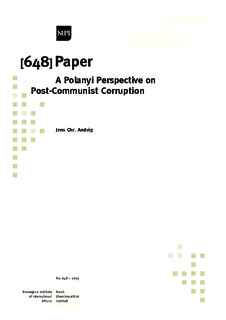| dc.contributor.author | Andvig, Jens Christopher | |
| dc.date.accessioned | 2016-06-28T10:47:00Z | |
| dc.date.accessioned | 2016-07-01T10:43:51Z | |
| dc.date.available | 2016-06-28T10:47:00Z | |
| dc.date.available | 2016-07-01T10:43:51Z | |
| dc.date.issued | 2003 | |
| dc.identifier.citation | Working Paper, NUPI nr 648. NUPI, 2003 | nb_NO |
| dc.identifier.issn | 0800 - 0018 | |
| dc.identifier.uri | http://hdl.handle.net/11250/2395226 | |
| dc.description | - | nb_NO |
| dc.description.abstract | The paper seeks to explain the present high levels of corruption in the post-communist countries, i.e. the centrally planned economies where the communist party lost power as the outcome of a specific historical process where both the character of the former economic system as well as that policy shock itself played key roles. Among the possible explanatory factors the study focuses on the effects of production decline and the ‘monetarisation’ of the economy which started before the policy shock. | nb_NO |
| dc.language.iso | eng | nb_NO |
| dc.publisher | NUPI | nb_NO |
| dc.relation.ispartofseries | NUPI Working Paper;648 | |
| dc.rights | Navngivelse-Ikkekommersiell-DelPåSammeVilkår 3.0 Norge | * |
| dc.rights.uri | http://creativecommons.org/licenses/by-nc-sa/3.0/no/ | * |
| dc.title | A Polanyi Perspective on Post-Communist Corruption | nb_NO |
| dc.type | Working paper | nb_NO |
| dc.date.updated | 2016-06-28T10:47:00Z | |
| dc.source.pagenumber | 31 p. | nb_NO |
| dc.identifier.cristin | 1364705 | |
| dc.subject.keyword | Internasjonal økonomi / International economics | |
| dc.subject.keyword | Økonomisk vekst / Economic growth | |

